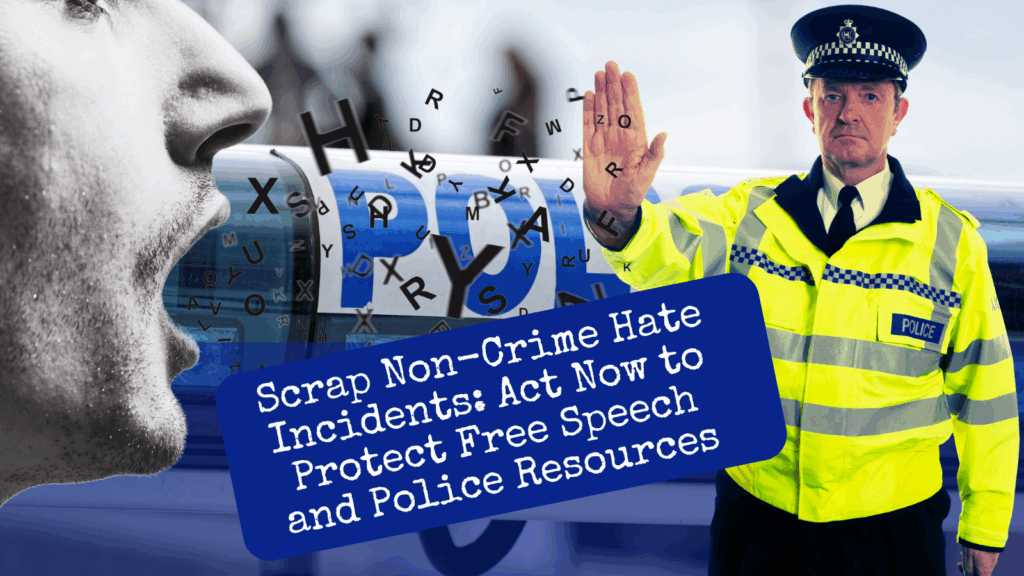The recording of Non-Crime Hate Incidents (NCHIs) in England and Wales is a flawed practice that wastes police resources, chills free speech, and disproportionately harms women advocating for their rights. Introduced by the College of Policing in 2014, NCHIs involve logging reports of perceived “hate” even when no crime has occurred. With over 250,000 NCHIs recorded since 2014, an average of 62 per day, this system diverts police from tackling actual crimes while penalising individuals, particularly women, for expressing lawful views. It’s time to act: read the Crime and Policing Bill, support the Opposition’s amendment to abolish NCHIs, and write to your MP using the template provided below or the one from the Free Speech Union.

The Problem with NCHIs
NCHIs are recorded when someone perceives an incident as motivated by hostility, even without evidence of criminality. This has led to absurd cases, like a Bedfordshire man reported for whistling the Bob the Builder theme tune at his neighbour (The Telegraph, 2021). More alarmingly, these records can appear on enhanced Disclosure and Barring Service (DBS) checks, potentially barring people from jobs like teaching or volunteering with organisations like the Samaritans. For children, NCHIs remain on record into adulthood, unlike criminal cautions, which are typically expunged at 18 (College of Policing, 2014).
The impact on women’s rights advocates is particularly stark. High-profile cases, such as For Women Scotland v. Scottish Ministers (2022), have spotlighted the legal definition of “woman.” Women like J.K. Rowling, Allison Bailey, and Maya Forstater, who defend sex-based rights, have faced NCHI investigations for expressing gender-critical views. For example, barrister Allison Bailey was investigated after tweeting about biological sex, damaging her professional reputation (The Times, 2022). Maya Forstater faced employment repercussions partly due to NCHI-related scrutiny (Forstater v. CGD Europe, 2021). These cases show how NCHIs are weaponised to silence women, stifling debate on critical legal and social issues.
Wasted Resources, Ignored Guidance
With only 6.7% of recorded crimes in 2022/23 resulting in a charge or summons (Home Office, 2023), police resources are stretched thin. Yet, they’re tasked with investigating “hurty words” instead of serious offenses. In 2023, then-Home Secretary Suella Braverman introduced guidance urging police to use “common sense” and avoid recording trivial NCHIs (Home Office, 2023). However, Free Speech Union data shows this guidance has been ignored, with Staffordshire Police recording a 140% increase in NCHIs since 2023 (Free Speech Union, 2024). Major forces like the Metropolitan Police conduct no meaningful analysis of NCHI data, undermining claims that it helps prevent crime (The Telegraph, 2023).
The Solution: Support the Amendment
The Opposition’s amendment to the Crime and Policing Bill offers a practical fix. It would abolish NCHIs, allowing police to record hate-related reports only when they aid crime detection or prevention, subject to senior approval. These records would not appear on DBS checks, protecting free speech and livelihoods. This change would refocus police on real crimes while safeguarding women and others targeted for their views.
Why It Matters
NCHIs don’t just waste police time, they silence debate and penalise women fighting for their rights. By supporting the amendment, you can help restore common sense to policing and protect free expression. The NCHI regime undermines free speech, wastes police time, and unfairly targets people defending their rights. You can make a difference. Act now: review the bill, write to your MP, and join the Free Speech Union’s campaign at freespeechunion.org.
Here’s how you can take action
- Reading the Crime and Policing Bill: Understand the amendment and its impact at freespeechunion.org.
- Writing to Your MP: Use the template below or the Free Speech Union’s version to urge your MP to support the amendment. Find your MP’s contact details at parliament.uk.
If you’re concerned about NCHIs, please use our campaigning tool to write to your MP using our template email. (FSU)

Completing the form is a simple, fast process that can have a significant impact. We’ve even provided a template to help, but feel free to personalise it. Your voice matters and it’s vital that you make it heard.
To be clear, do not try to personalise the email by trying to change the template. To personalise it, first tick the box to create the letter (after filling in your details), then tick the box saying you’d like that letter to be emailed to you. You’ll then get a copy of the letter, along with the email address to use to contact your MP. If you then click on the MP’s email address it will create an email to them that you can copy and paste the text of the letter into – and at that point you can either send it as written or personalise it.
If you’re concerned about NCHIs, please use my template (focussing on women’s rights) but you could cite issues important to you and write to your MP (SEE BELOW)
References
- Government Bill https://bills.parliament.uk/bills/3938 Crime and Policing Bill
- College of Policing. (2014). Hate Crime Operational Guidance.
- Free Speech Union. (2023). Non-Crime Hate Incidents: FOI Data Analysis. Retrieved from freespeechunion.org.
- Home Office. (2023). Crime Outcomes in England and Wales 2022/23. Retrieved from gov.uk.
- The Telegraph. (2021). Man Reported for Whistling Bob the Builder Theme. Retrieved from telegraph.co.uk.
- College of Policing. (2014). Hate Crime Operational Guidance. Retrieved from college.police.uk .
- The Times. (2022). Allison Bailey: Barrister Targeted by NCHI for Gender-Critical Views. Retrieved from thetimes.co.uk.
- Forstater v. CGD Europe and Others. (2021). Employment Appeal Tribunal, Case No. UKEAT/0105/20/JOJ.
- Free Speech Union. (2024). NCHI Recording Trends Post-2023 Guidance. Retrieved from freespeechunion.org.
- The Telegraph. (2023). No Analysis of NCHI Data by Major Police Forces. Retrieved from telegraph.co.uk.
